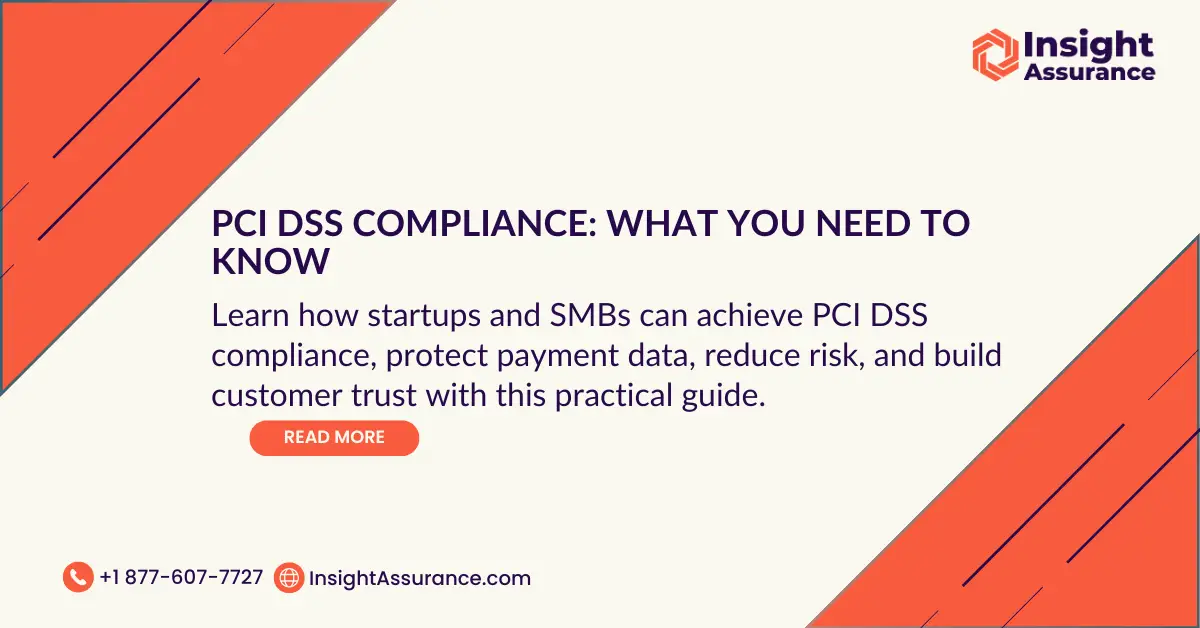Achieving PCI DSS compliance is more than a regulatory checkbox. It’s a critical step toward protecting your business, earning customer trust, and reducing the risk of costly breaches.
PCI DSS (Payment Card Industry Data Security Standard) provides a clear set of requirements to help businesses securely process, store, and transmit payment card information. For smaller organizations handling payment card data, it’s a practical way to build a strong security foundation and show stakeholders you take data protection seriously — even with limited resources.
What Is PCI DSS and Why Does It Matter?
PCI DSS is a global framework designed to protect credit card information. It establishes guidelines for protecting payment card data at every touchpoint — whether your business processes, stores, transmits, or could affect its security. By adhering to these standards, you reduce the risk of data breaches and show your customers that you take their security seriously.
The PCI Security Standards Council (PCI SSC) is the group behind these standards. Made up of major payment brands like Visa and Mastercard, the Council regularly updates PCI DSS to address evolving cyber threats. Their goal is to help businesses like yours stay protected in a constantly changing cyber security environment.
For any business, achieving PCI DSS compliance is essential, not only because it helps prevent costly data breaches and fines but also because it builds confidence among your customers. These security requirements are especially important for startups and small-to-medium-sized businesses (SMBs) that may face resource constraints but still need to protect cardholder data and sensitive authentication data effectively.
Key Benefits of PCI DSS Compliance
Here’s how PCI DSS compliance can benefit your business:
- Stronger Security: Protect your payment systems from data breaches and fraud with robust security controls.
- Customer Trust: Show your customers that you take data security seriously.
- Reputation Protection: Avoid the fallout from PCI non-compliance, including negative publicity and financial losses.
- Operational Resilience: Strengthen your processes with best practices like a vulnerability management program.
- Business Growth: Enable secure transactions that support your long-term success.
By meeting the PCI DSS requirement, you not only protect your customers but also position your business for sustainable growth.
Navigating PCI DSS Compliance: What Startups Need To Know
PCI compliance is based on 12 core requirements designed to protect payment card data and prevent unauthorized access. These requirements offer a practical roadmap to help you strengthen your business’s security.
Here’s a quick overview:
- Install and maintain network security controls.
- Apply secure configurations to all system components.
- Protect stored account data.
- Protect cardholder data with strong cryptography during transmission over open, public networks.
- Protect all systems and networks from malicious software.
- Develop and maintain secure systems and software.
- Restrict access to system components and cardholder data by business need to know.
- Identify users and authenticate access to system components.
- Restrict physical access to cardholder data.
- Log and monitor all access to system components and cardholder data.
- Test security of systems and networks regularly.
- Support information security with organizational policies and programs.
These PCI DSS requirements work together to create a robust defense against data breaches. But how can your business implement some of these safeguards?
- Secure Networks: Building a secure network is one of the first steps in PCI DSS compliance. Firewalls act as your first line of defense, blocking unauthorized access to sensitive data. Adding encryption further protects information by making it unreadable to anyone without the proper credentials. These measures ensure compliance with the PCI security standard.
- Access Control: Limit access to cardholder data to only those who absolutely need it. Use tools like multi-factor authentication and strong password policies to add extra layers of protection. Incorporating strong access control measures helps prevent unauthorized users from gaining access to sensitive systems.
Both of these technical safeguards are essential for meeting the PCI security standards and protecting payment card data security.
Common Mistakes To Avoid:
- Neglecting regular updates: Security threats evolve, so staying current with patches and updates is critical.
- Poor documentation: Keep records of your PCI DSS compliance efforts to simplify audits and ensure accountability.
- Underestimating employee training: Your team is your first line of defense — don’t overlook their role in maintaining security.
3 Practical Steps for Achieving PCI DSS Compliance
For startups and SMBs, the path to PCI DSS compliance may feel overwhelming at first. Here’s how to get started:
1. Conducting a Gap Analysis and Risk Assessment
Begin by identifying where your current processes and systems fall short of the DSS requirements. A gap analysis can show you exactly what needs improvement. Pair this with a risk assessment to uncover vulnerabilities and prioritize actions to address them.
Tools like automated scanners or penetration testing can help assess your security posture. These insights will guide your next steps, ensuring you focus on the most critical areas first.
2. Training Your Team
Compliance isn’t just about technology — it’s about people. Make sure your team understands the PCI DSS standard and their role in protecting payment card data security. Offer training on topics like secure handling of sensitive information, spotting phishing attempts, and maintaining strong passwords.
Creating a security-conscious culture within your business will help prevent mistakes that could lead to data breaches.
3. Partner With a Qualified Security Assessor (QSA)
Partnering with a QSA can make the compliance process much smoother. These experts provide tailored guidance to help you understand the PCI DSS requirements, close compliance gaps, and prepare for audits.
Empowering Your Business With PCI DSS Compliance
Meeting PCI DSS standards helps protect your customers, strengthen your brand, and support long-term business growth. It’s a smart move in today’s security-first world.
Ready to take the next step? Contact Insight Assurance to see how our experienced auditors can help you navigate PCI DSS requirements with clarity and confidence.

